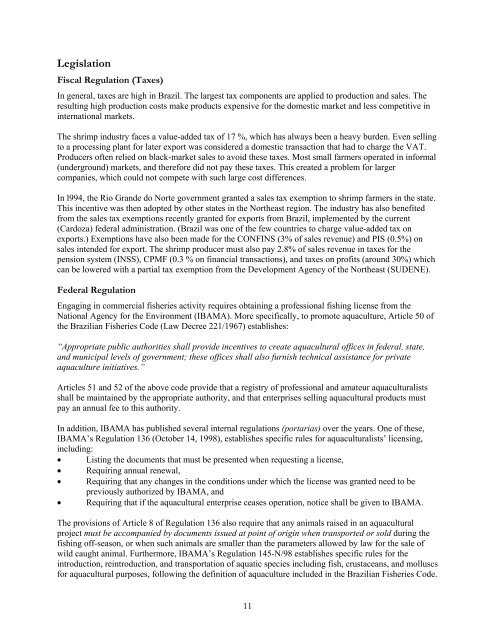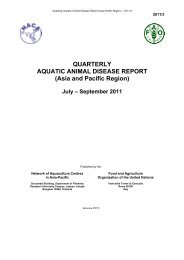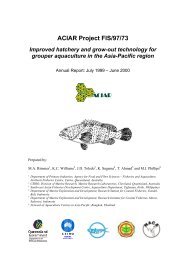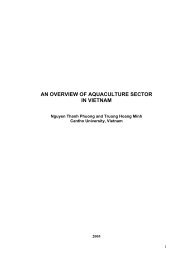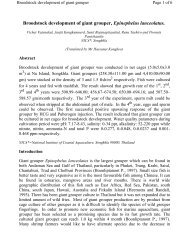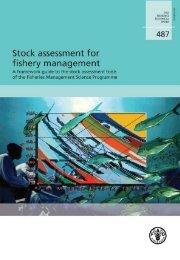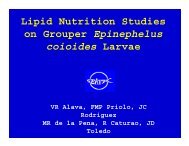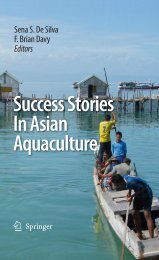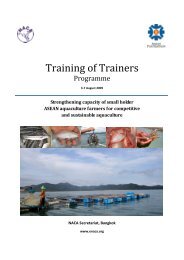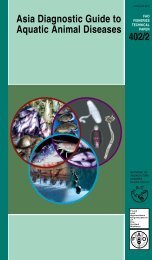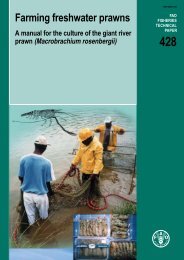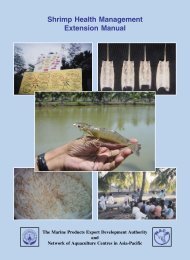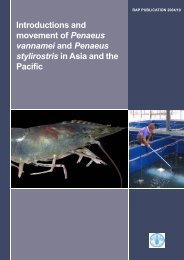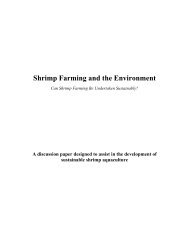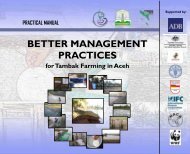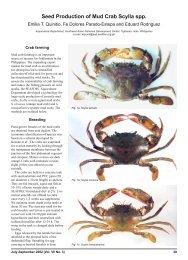Shrimp Farming in Brazil: An Industry Overview - Library - Network of ...
Shrimp Farming in Brazil: An Industry Overview - Library - Network of ...
Shrimp Farming in Brazil: An Industry Overview - Library - Network of ...
Create successful ePaper yourself
Turn your PDF publications into a flip-book with our unique Google optimized e-Paper software.
Legislation<br />
Fiscal Regulation (Taxes)<br />
In general, taxes are high <strong>in</strong> <strong>Brazil</strong>. The largest tax components are applied to production and sales. The<br />
result<strong>in</strong>g high production costs make products expensive for the domestic market and less competitive <strong>in</strong><br />
<strong>in</strong>ternational markets.<br />
The shrimp <strong>in</strong>dustry faces a value-added tax <strong>of</strong> 17 %, which has always been a heavy burden. Even sell<strong>in</strong>g<br />
to a process<strong>in</strong>g plant for later export was considered a domestic transaction that had to charge the VAT.<br />
Producers <strong>of</strong>ten relied on black-market sales to avoid these taxes. Most small farmers operated <strong>in</strong> <strong>in</strong>formal<br />
(underground) markets, and therefore did not pay these taxes. This created a problem for larger<br />
companies, which could not compete with such large cost differences.<br />
In l994, the Rio Grande do Norte government granted a sales tax exemption to shrimp farmers <strong>in</strong> the state.<br />
This <strong>in</strong>centive was then adopted by other states <strong>in</strong> the Northeast region. The <strong>in</strong>dustry has also benefited<br />
from the sales tax exemptions recently granted for exports from <strong>Brazil</strong>, implemented by the current<br />
(Cardoza) federal adm<strong>in</strong>istration. (<strong>Brazil</strong> was one <strong>of</strong> the few countries to charge value-added tax on<br />
exports.) Exemptions have also been made for the CONFINS (3% <strong>of</strong> sales revenue) and PIS (0.5%) on<br />
sales <strong>in</strong>tended for export. The shrimp producer must also pay 2.8% <strong>of</strong> sales revenue <strong>in</strong> taxes for the<br />
pension system (INSS), CPMF (0.3 % on f<strong>in</strong>ancial transactions), and taxes on pr<strong>of</strong>its (around 30%) which<br />
can be lowered with a partial tax exemption from the Development Agency <strong>of</strong> the Northeast (SUDENE).<br />
Federal Regulation<br />
Engag<strong>in</strong>g <strong>in</strong> commercial fisheries activity requires obta<strong>in</strong><strong>in</strong>g a pr<strong>of</strong>essional fish<strong>in</strong>g license from the<br />
National Agency for the Environment (IBAMA). More specifically, to promote aquaculture, Article 50 <strong>of</strong><br />
the <strong>Brazil</strong>ian Fisheries Code (Law Decree 221/1967) establishes:<br />
“Appropriate public authorities shall provide <strong>in</strong>centives to create aquacultural <strong>of</strong>fices <strong>in</strong> federal, state,<br />
and municipal levels <strong>of</strong> government; these <strong>of</strong>fices shall also furnish technical assistance for private<br />
aquaculture <strong>in</strong>itiatives.”<br />
Articles 51 and 52 <strong>of</strong> the above code provide that a registry <strong>of</strong> pr<strong>of</strong>essional and amateur aquaculturalists<br />
shall be ma<strong>in</strong>ta<strong>in</strong>ed by the appropriate authority, and that enterprises sell<strong>in</strong>g aquacultural products must<br />
pay an annual fee to this authority.<br />
In addition, IBAMA has published several <strong>in</strong>ternal regulations (portarias) over the years. One <strong>of</strong> these,<br />
IBAMA’s Regulation 136 (October 14, 1998), establishes specific rules for aquaculturalists’ licens<strong>in</strong>g,<br />
<strong>in</strong>clud<strong>in</strong>g:<br />
• List<strong>in</strong>g the documents that must be presented when request<strong>in</strong>g a license,<br />
• Requir<strong>in</strong>g annual renewal,<br />
• Requir<strong>in</strong>g that any changes <strong>in</strong> the conditions under which the license was granted need to be<br />
previously authorized by IBAMA, and<br />
• Requir<strong>in</strong>g that if the aquacultural enterprise ceases operation, notice shall be given to IBAMA.<br />
The provisions <strong>of</strong> Article 8 <strong>of</strong> Regulation 136 also require that any animals raised <strong>in</strong> an aquacultural<br />
project must be accompanied by documents issued at po<strong>in</strong>t <strong>of</strong> orig<strong>in</strong> when transported or sold dur<strong>in</strong>g the<br />
fish<strong>in</strong>g <strong>of</strong>f-season, or when such animals are smaller than the parameters allowed by law for the sale <strong>of</strong><br />
wild caught animal. Furthermore, IBAMA’s Regulation 145-N/98 establishes specific rules for the<br />
<strong>in</strong>troduction, re<strong>in</strong>troduction, and transportation <strong>of</strong> aquatic species <strong>in</strong>clud<strong>in</strong>g fish, crustaceans, and molluscs<br />
for aquacultural purposes, follow<strong>in</strong>g the def<strong>in</strong>ition <strong>of</strong> aquaculture <strong>in</strong>cluded <strong>in</strong> the <strong>Brazil</strong>ian Fisheries Code.<br />
11


